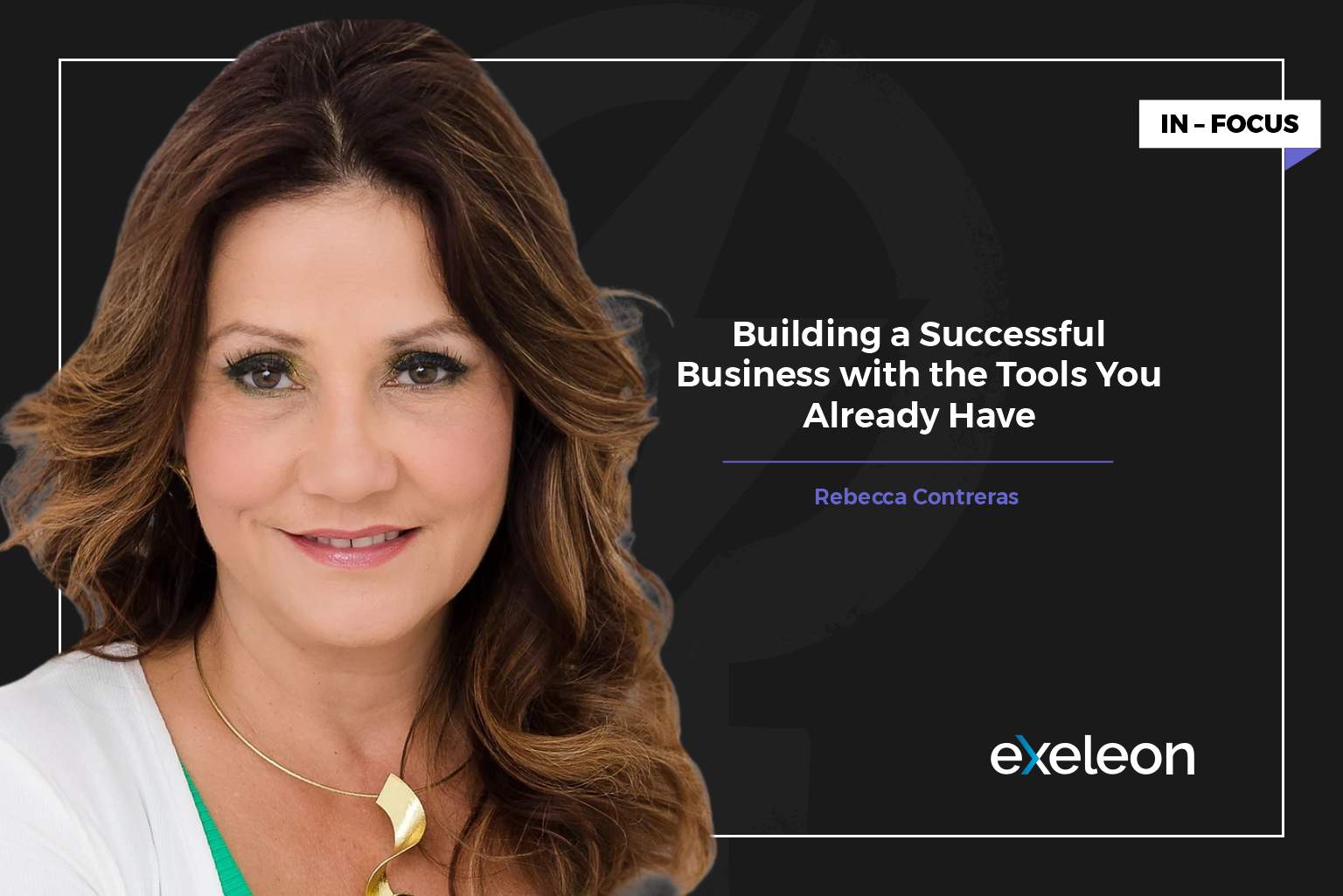
Following is an article written by Rebecca Contreras, Founder and CEO of AvantGarde, on building a successful business by leveraging the skills and tools you already possess. The article is part of Exeleon’s 2024 Women History Month Celebration.
Building a business is not for the weak at heart. Overnight successes are rare. According to the Bureau of Labor Statistics’ Business Employment Dynamics, only 50% of businesses survive their fifth year of operation, and only 30% of businesses will make it past the ten-year mark. Being an entrepreneur is filled with challenges and setbacks, but it can provide you with opportunities that you can only imagine working as a W2 employee.
I never thought I would go from being a government and W2 employee to a successful entrepreneur. My mentors and people I worked with were the first ones who brought up the notion.
After I quit my long-term government career, I took a position as an EVP at a small company. Even though I held an executive position, I had no ownership of the company. For six years, I helped the owners grow their business, but I wasn’t able to share in the profit despite being responsible for developing the growth of a practice area which ultimately represented 80% of the company’s revenue. I started to think twice about what my mentors and people I worked with said, “if I was successful in helping someone else build and grow their business, I can do the same for myself.”
When I first began, I knew nothing about starting a business or running a business. What I did know was that I had fifteen years of experience working for the state and federal government, twelve of those years growing aggressively in my leadership execution, so I took what I knew and used them to build AvantGarde.
Here are three essential principles that I learned in my twelve years serving the former Texas Governor and President Bush that helped me build a successful business.
Look at the tools you already have
Before you put a business plan into action, think about (1) what you can offer that is worth something to someone else, (2) who might need it, and (3) who might acquire it.
I held leadership positions in the Texas State Government and at the White House, which taught me how to be a results-driven, outcome-based leader. Because of my background and upbringing, I had tremendous tenacity and resilience to work and deal with difficult issues. I went from being a pregnant, teenage dropout living in poverty who survived all sorts of abuse to holding a senior executive position as a Commissioned Officer at the White House when 9/11 happened. I knew there was little I could encounter that would stop me. I built a reputation for myself as the go-to person to get things done. I was the change agent who would take the initiative and orchestrate changes to solve problems.
During my tenure as the EVP, I contributed to the growth of the business through the experience, gifts, and talents cultivated during my 15 years in government service. I was confident these same skills can help with the development of my own business.
Build a network
No business can survive in a silo. Afterall, you’re asking people to do business with you, but people tend to only do business with those they like and want to work with. Having a strong network can help make your business, and the lack of one can break it.
During my time in my government career, I built a very strong network of people who trusted me, relied on me, and could count on me to deliver. When I started my business, they became my superpower and the key to my initial success. I had a rolodex with hundreds of people who I could call and connect with in person. Once it became clear that my consulting services would benefit any organization, including government agencies, I reached out to my network and began marketing. I didn’t get my first clients by cold calling people; instead, I tapped my warm leads.
I also devise a strategy and process to evolve my business from being merely a vendor to a “trusted advisor.” It is much harder to replace a proven, trust advisor than just a vendor, who may be providing services others provide.
Nearly thirteen years later, more than 80% of AvantGarde’s clients are the results of our current or former clients’ networks. Never underestimate the power of your network when building your business.
Leverage your expertise, but build on top of it to scale
In order to convince your potential customers to invest in you, you need to establish yourself as a thought leader and expert in the business. Once you’re known in the marketplace as a thought leader or expert, bring people who can build on top of the values your business has to offer onto your team.
When I started AvantGarde, more than 80% of our business was in HR even though it was a consulting firm for HR, Strategy and IT services. However, HR was the focus of my entire government career and the expertise I brought to the table. Once revenue began to flow, I hired other people whose expertise complemented mine. For example, I wanted to scale up our service offerings to give our clients a holistic approach to their problems, so I hired people who were smarter than me—people who were experts in the areas I want to scale up in such as Organizational Development, Change Management, Strategy, and Business Process IT. I also teamed with a partner who had a robust IT background and expertise. This elevated our capabilities as a firm.
I believe that anyone can build a thriving business in America as long as they have (a) a vision, (b) a specific skill set, expertise, or talent, (c) a robust network, (d) and a well-thought-out plan of execution. Nothing is more satisfying than reaching your goals and seeing your vision come to fruition. If you think being an entrepreneur is your calling, here are 10 steps that you can begin taking now to achieve your entrepreneurial goal.
Ten Steps to Begin Your Entrepreneurial Journey
- Determine what you have to offer. Once you decide what that is, set yourself apart by identifying what makes your offering unique.
- Create a business plan or strategy. DO NOT jump out and start a business with no plan. Make a plan and stick to it. Incorporate phases of development and set realistic milestones.
- Learn 101 about starting a business. Learn all that there is to know about how to set up the right structure from the get-go. This includes learning the legal requirements and regulations, protecting intellectual property, obtaining the appropriate insurance, and even considering your long-term exit strategy.
- Pick the right partner. A business partnership is like a marriage. You have to stick together through thick and thin. Take inventory of your shared values and goals, and whether your skills complement one another, etc.
- Map out your financial plan. Determine what your financial needs are and how you plan to fund the first stages of development.
- Build your brand. Think about how you will showcase and advertise your business to your potential customers. Start with a basic website and a simple marketing plan using social media to your advantage.
- Build and expand your network. If you don’t have a professional network, focus on building a network as soon as possible and continually invest energy into expanding it.
- Make an operational plan. Unlike a business plan that focuses on high-level strategies, an operational plan lays out tactical steps, the “who, how, when, what,” necessary to execute your business plan.
- Engage the right people to support your business. Having PEOPLE on your team can make or break a CEO or entrepreneur, so it is important to hire people who believe in your cause and champion your vision.
- Focus on continual learning. You can find a business mentor, join a chamber group, or take classes on zoom, online or with your local chamber. The more knowledge you gain, the more knowledge you will have in building your business.
We live in a country that affords anyone, regardless of their background, pedigree, or status to build and grow a business – I am living proof of that! Embrace your vision, leverage your strengths, and build meaningful connections. Remember, the tools are within reach – now, it’s time to craft your story.
About Rebecca Contreras
Rebecca Contreras is the Founder and CEO of AvantGarde—an Austin-based consulting firm that federal agencies depend upon to help them transform their leadership and grow their organization through holistic and sustainable approaches. Unlike most entrepreneurs, Rebecca was born into poverty. But through grit, resolve, and steadfast commitment, Rebecca transformed herself from a high school dropout and welfare-dependent teenage mother to a successful business leader. She has received a number of accolades for her exceptional leadership such as being named the 2023 Austin Business Woman of the Year and having received a golden Stevie award for Best Female Entrepreneur in 2022.










